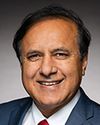Let me just put a finer point on it. Indulge me for 30 seconds. I promise not to take too much time.
Having a background in international law, the only thing I can tell you I'm certain about is that you'll find people who disagree on different points. If you include the terms of the safe third country agreement, then certainly that's an element of that legal obligation; however, I think, in addition to it having some basis in the agreement, it's advisable. We don't want to encourage people to take on often dangerous or perilous journeys. It's a principle that I've seen the UNHCR support in the past. There is some debate about whether it's firmly embedded in different international legal instruments.
I think it's advisable to adhere to that principle, and it is adopted as a principle in the safe third country agreement as well.




